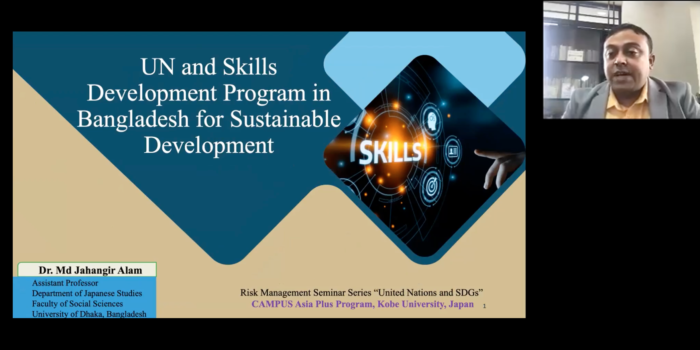Field Research in Uganda (Takeru NUMASAWA)
From September 3rd to October 8th 2015, I conducted field research in Uganda, with a purpose of studying teacher absenteeism in public primary schools. While I stayed in Uganda, I...
Graduate School of International Cooperation Studies (GSICS), Kobe University


As part of the United Nations and Sustainable Development Goals seminar series, on Saturday, January 23rd, Associate Professor Jahangir Alam, from the University of Dhaka, former Ogawa zemi student gave his lecture. The topic was ‘United Nation and Skill Development in Bangladesh for Sustainable Development’.
According to Dr. Alam, there are some key issues in the Bangladeshi education sector, such as access to education services and completion of each education stage, quality, relevance, and efficiency, especially skill development in all types of education institutions at all levels. Skill development is one of the important components for the country to have success, not only for a healthy society but also for successful individuals within the country in the 21st century. Skill development can also provide economic and social structural transformation, and economic growth by enhancing employability and labor market productivity and helping countries to become more competitive in the context of globalization.
In the past decades, Bangladeshi government has been improving five sectors towards the SDGs with corroborating ILO (International Labour Organization) and other international organizations: i) working conditions, ii) skills and employment, iii) partnership with private institutions, ix) social protection, and x) rights at work to produce better human capital development and increase decent work. Those sectors are key issues and have high priority to achieve SDGs’ goals in Bangladesh. In addition, to become sustainable economically, and a developed country, Bangladesh needs to consider human resources. Human resources will contribute decent work in the future, however, data is limited and policy of the private sector is needed to develop to support labor forces which is a challenge to improve future employability.
In conclusion, the government should take the job market into account, and address the employability. The Bangladesh government needs to grasp the needs of the labor market and introduce future sustainable development to effective utilization of international and local partnerships. Dr. Alam delivered the latest and detailed information about the skill development program including their challenge within the country, thus it was a great opportunity for audiences to understand the current situation in Bangladesh. He concluded his studies at Kobe University under the supervision of Professor Ogawa in 2020. He is organizing the International Hybrid Conference on Post-COVID Japan: economy, political, society, culture and literature that will occur on 18-19 March, 2022.
Authored by Mami Fujiwara (Doctoral Student)